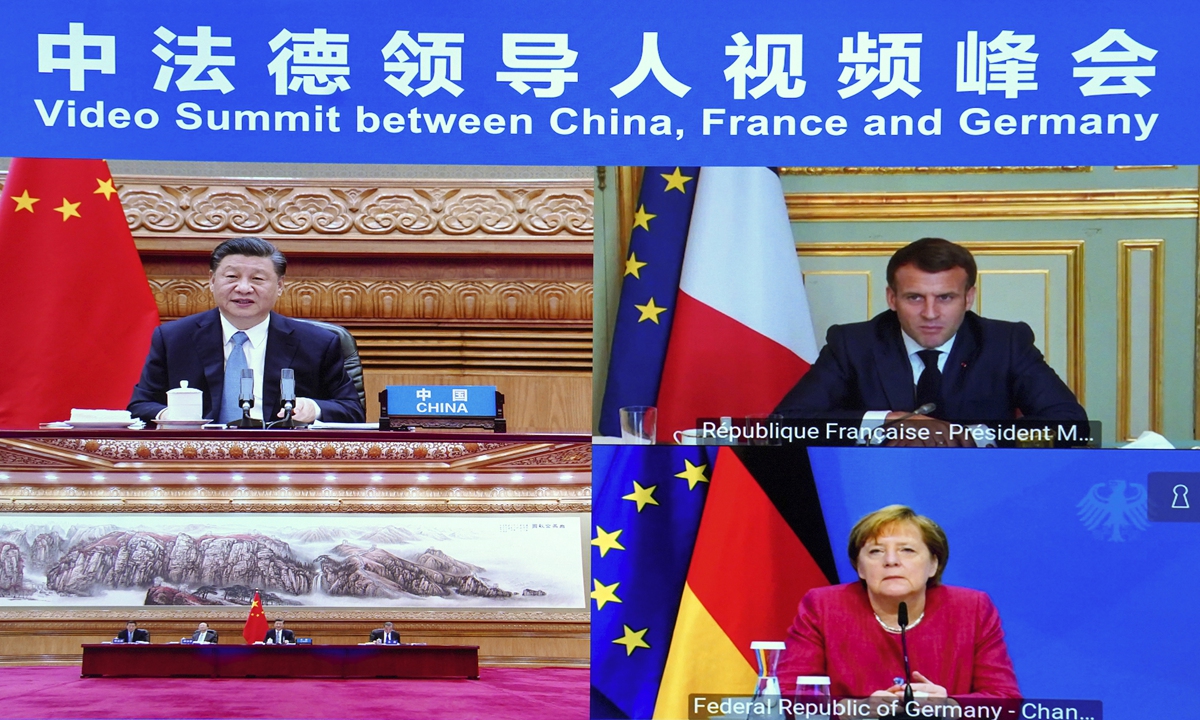Summit of leaders from China, France, Germany shows good timing: Global Times editorial

Chinese President Xi Jinping, French President Emmanuel Macron and German Chancellor Angela Merkel hold a virtual meeting Friday on climate change, China-Europe relations, anti-epidemic cooperation, and major international and regional issues. Photo: Xinhua
Chinese President Xi Jinping, French President Emmanuel Macron and German Chancellor Angela Merkel held a video summit on Friday. The leaders of the three countries exchanged in-depth views and reached a consensus for cooperation on climate change, China-Europe relations, anti-epidemic cooperation, and major international and regional issues.
The video summit was held less than a week before the virtual Leaders Summit on Climate initiated by the US. China, France and Germany are the most active promoters of the 2015 Paris climate accord. The US attitude toward it has been extremely unstable. The Obama administration participated in promoting the deal but the Trump administration rudely withdrew from it. The Biden administration appears to have a positive attitude. But over the past years, the US has evaded a large number of its obligations. It is the slowest among developed countries to make progress in reducing emissions. Washington has not sent any signals about meeting these missed commitments.
The Biden administration seems to be more interested in “playing the leading role” in climate action. But once the US goes through another power rotation, it might go back on its word again. Meanwhile, the current administration is putting too much emphasis on political performance and geopolitics. The international community is uncertain whether Washington can bring effective and continuous promotion of climate action.
It was necessary for China, France and Germany to convene the summit before the Leaders Summit on Climate. The coordinated positions of these three countries will help the Leaders Summit on Climate focus on the implementation of the Paris Agreement, rather than diverting people’s attention in other directions. The Paris Agreement is a great plan of action. Every country fulfilling their own obligations according to the deal’s spirit is far more important than anything else. New global summits on climate should play a role to complement and boost the Paris Agreement.
International relations are currently going through twists and turns, China-US tensions keep heating up, while Europe emphasizes strategic autonomy. Some controversies over human rights issues have emerged between China and European countries and China-Europe ties have frequently been discussed recently. From the perspective of China’s ties with Europe, France and Germany, the three-country summit comes at a good time. It underlines an indispensable factor in Europe’s foreign strategy.
The most crucial principles of international relations today are equality, mutual benefit and seeking truth from facts. The climate issue is related to the future of mankind. Many hands provide great strength. Whoever can do more should contribute more, while those who face difficulties should also have a positive attitude.
As the largest developing country, China has just achieved building a moderately prosperous society in all respects. It is still far from realizing modernization. It is the nation’s basic right to continue improving people’s living standards through development. Meanwhile, China is proactively fulfilling its obligations. It publicly promised to hit peak emissions before 2030 and achieve carbon neutrality by 2060. Most countries in Europe and the entire international community are satisfied with China’s efforts. Macron has repeatedly affirmed China’s attitude.
US climate envoy John Kerry is visiting China to discuss joint efforts to curb carbon emissions. But a US State Department spokesperson spoke to reporters on condition of anonymity, saying that China “is not yet on a path that will allow the world to meet the Paris Agreement’s goal.” Washington is the least qualified to judge China given its own performance. Perhaps it is aware of the fact, which is why the spokesperson didn’t give his or her name.
China is able to set emission reduction targets while developing, and has made the upper limit of the contribution that developing countries can make in global climate action. Developed countries have caused the bulk of the historical accumulation of carbon dioxide in the atmosphere. China’s total population exceeds that of developed countries combined, but our emissions of greenhouse gases will definitely be much less than the total emissions of developed countries. The figures will not even be comparable.
China has also developed a large number of cost-effective and efficient emission reduction technologies, and has gradually come to the forefront of this field. Our national awareness and willingness to reduce emissions, as well as technological reserves are all taking big steps forward. The concept of carbon neutrality has gradually become prominent in Chinese society. All these factors have boosted the guarantee for China and Europe to join hands in strengthening UN climate action.
It is hoped that the US will do more to promote global climate action and that it will be less concerned about burnishing its leading role. Global climate action was previously going smoothly until the Trump administration withdrew from it. Now Washington has returned to the fold, but it should first sincerely apologize and pay its old debts. Inviting world leaders to the Leaders Summit on Climate is supposed to be a move of redemption, but definitely not “the return of the king.”
